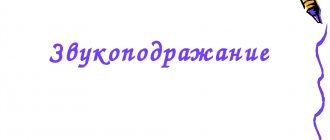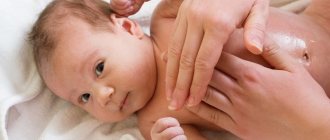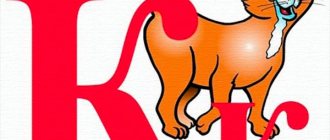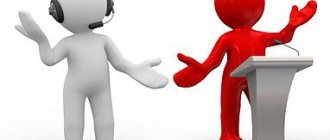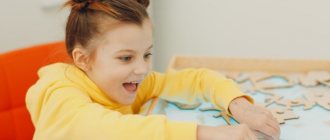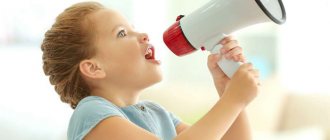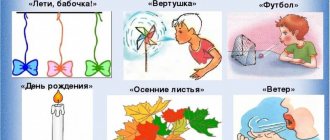What is active and passive vocabulary?
All the words that a child knows are his vocabulary (lexicon).
At the same time, those words that the baby understands, but does not pronounce himself, belong to the passive dictionary. And those words and phrases that are constantly used in everyday speech are included in the active one.
For example, if you ask a one-year-old baby “where is the cat?” and he points to the pet or the corresponding picture with his finger, which means the word “cat” is already in his passive dictionary. When the baby independently says “cat”, or “koska”, or any other sound that means a cat for the child, we can say that the word has become an active lexicon.
It is worth noting that the passive vocabulary is always larger than the active one, even in an adult. After all, each of us knows what society, quantum, molecule are, yet we almost never use these words in everyday speech.
Help with speech development
The most important condition for a child’s speech development is constant communication with him. Children need conversations, words and support from the first months of life. However, there are also some requirements for communication with the child. Their observance ensures that babies begin to speak much earlier than a year. In what way should you interact with young children?
- Eye to eye contact. When communicating, it is important to hold the child’s gaze, then he will be attentive to the adult’s speech.
- Correct pronunciation of words. You cannot distort or distort verbal structures. In addition, you should not repeat incorrect sound pronunciation or funny words that the baby pronounces. The child quickly grasps everything and can remember exactly the wrong option. Then it will be difficult to re-teach him, no matter how much you repeat the word clearly and correctly.
- Expanding your horizons. To have something to talk about and ask about, you need new impressions. Various walks, excursions, travel, and games with other children have a beneficial effect on children’s speech.
- Use of artistic words. Reading and telling fairy tales, rhymes, nursery rhymes expands vocabulary and activates interest in speech. Children especially enjoy playing out different stories. For this purpose, you can use finger puppets, as well as organize family performances.
- Development of the hand. Fine motor skills activate the speech apparatus - this has been proven by many scientists. The baby's hands begin to be massaged, then from the first months of life they place a variety of objects in the palm of his hand, different in texture and properties. The main thing is that these toys are safe for the baby.
- Moderate stress on the psyche. A lot of training and development is also harmful. Experience and attentive attitude will help you figure out how much educational activities a particular child needs during the day. Children demonstrate overwork through whims and crying. In addition, they may become sleepy and look painful. Then you should give your baby some rest, turn on some pleasant music, and take a silent walk with him in nature.
- Maintaining a favorable emotional climate in the family. It has been noticed that in happy families, children begin to speak much earlier, sometimes as early as eight months. If scandals and misunderstandings reign in the life of a husband and wife, the baby responds acutely to this by immersing himself in his inner world. As a consequence, there is a slowdown in mental development as a whole. No matter how much you work with a child, his development will lag behind his peers until conflicts in the home stop.
Article on the topic: Benefits for the whole body!: sainfoin honey
For a small child, the family is the backbone, support and protection where he can express himself. The affectionate, attentive, caring attitude of both parents ensures that their children begin not only to speak early, but also to be ahead of their peers in mental development in general. In the future, such children have every chance of becoming gifted, which means they are able to explore this world with joy and interest, actively develop in various activities, become pride for their families and an example for other children.
How to calculate the volume of active and passive vocabulary?
Finding out the approximate number of words in a passive dictionary is easy. It is enough to ask the child to show a certain object, action, object (for example, a cat). If the child did everything correctly, then the word is counted in the passive dictionary.
Now let’s calculate the size of the active dictionary. What should you consider?
1. Words that the baby pronounces clearly: “give”, “mom”, “dad”.
2. Sounds - imitation of animals, objects: car “beep-beep”, dog “woof-woof”.
3. Reproduction of incomplete words: “baka” – dog.
4. Words that are not pronounced correctly, but the number of syllables and stress are correct: “patina” - machine.
5. Words that are pronounced the same, but have different meanings (norm up to 2.5 years): “ma” - mom, car, meow (each word is counted separately).
To make it easier to count your active vocabulary and clearly see the progress and dynamics of your child’s development, I recommend that you keep a speech development diary . Every month you can enter the words that your baby has mastered. From 2.5-3 years old, keeping track of every word will be quite difficult due to the growing talkativeness. Then you can write down funny sayings from your baby in your diary, which you will be happy to re-read in the future.
Compiled by: teacher - speech therapist MADOU TsRR - kindergarten No. 50 of the city of Tyumen S.S. Badryzlova
Every parent is concerned about whether their child is developing correctly. If you are looking forward to your baby’s first words or he has already begun to slowly master speech, knowledge of the concepts of passive and active vocabulary and their role in the child’s development will help you correctly assess the speech level and choose the optimal exercises for the baby.
What is active and passive vocabulary?
All the words that a child knows are his vocabulary (lexicon). Moreover, those words that the baby understands, but does not pronounce himself, belong to the passive dictionary. And those words and phrases that are constantly used in everyday speech are included in the active one.
For example, if you ask a one-year-old baby “where is the cat?” and he points to the pet or the corresponding picture with his finger, which means the word “cat” is already in his passive dictionary. When the baby independently says “cat”, or “koska”, or any other sound that means a cat for the child, we can say that the word has become an active lexicon.
It is worth noting that the passive vocabulary is always larger than the active one, even in an adult. After all, each of us knows what society, quantum, molecule are, yet we almost never use these words in everyday speech.
How to calculate the volume of active and passive vocabulary?
Finding out the approximate number of words in a passive dictionary is easy. It is enough to ask the child to show a certain object, action, object (for example, a cat). If the child did everything correctly, then the word is counted in the passive dictionary.
Now let’s calculate the size of the active dictionary. What should you consider?
1. Words that the baby pronounces clearly: “give”, “mom”, “dad”.
2. Onomatopoeia for animals and objects: car “beep-beep”, dog “woof-woof”.
3. Reproduction of incomplete words: “baka” – dog.
4. Words that are pronounced incorrectly, but the number of syllables and stress are correct: “patina” - machine.
5. Words that are pronounced the same, but have different meanings (norm up to 2.5 years): “ma” - mom, car, meow (each word is counted separately).
To make it easier to count the active vocabulary and clearly see the progress and dynamics of the child’s development, parents are recommended to keep a diary of speech development. Every month you can enter the words that your child has mastered. From 2.5-3 years old, keeping track of every word will be quite difficult due to the growing talkativeness. Then you can write down funny sayings from your baby in your diary, which you will be happy to re-read in the future.
How many words should a child have in his active vocabulary?
The norms for the formation of the active vocabulary of a child of preschool and primary school age are as follows:
Thus, if at 1 year old a child normally pronounces no more than 10 words, then at 3 years old the child’s vocabulary is already about 1000 words. The vocabulary of a 5-year-old child is already about 2,000 words, and the vocabulary of a 6-year-old child is about 3,500 words. Don't panic if you suddenly find that your child is speaking fewer words than normal. Each child is individual and develops at his own pace. There are children who begin to speak closer to 2 years old, but understand everything already at 1-1.5 years old.
If you still have doubts or questions about your baby’s development, for your own peace of mind, consult a specialist. As a rule, the inclusion of certain games for developing vocabulary in spending time together is enough for the child to catch up and even surpass his peers.
Balance of active and passive vocabulary or why develop speech?
As mentioned earlier, a passive dictionary will always be larger in volume than an active one. At the same time, we should strive to achieve a balance between dictionaries, that is, try to use as many words as possible that we know in everyday speech. And teach this to our children. For what?
In modern society, people who can speak well and interestingly, with developed oratory skills, are valued. The ability to express one’s thoughts clearly and beautifully, captivate the audience, and win the interlocutor to one’s side will help the child in school, in communicating with peers, and throughout adult life. In addition, an increase in vocabulary entails the development of intelligence, memory, attention, imagination and perception.
A child with a rich vocabulary communicates more easily with adults and other children, and accordingly, adapts better in society. It is easier for such children to learn poetry, solve logical problems, create, and, in general, realize themselves.
That is why the main task of parents is to help maximize the child’s natural potential and stimulate the development of mental abilities.
How many words should a child have in his active vocabulary?
The norms for the formation of the active vocabulary of a child of preschool and primary school age are as follows:
Thus, if at 1 year old a child normally pronounces no more than 10 words, then at 3 years old the child’s vocabulary is already about 1000 words. The vocabulary of a 5-year-old child is already about 2,000 words, and the vocabulary of a 6-year-old child is about 3,500 words. Don't panic if you suddenly find that your child is speaking fewer words than normal. Each child is individual and develops at his own pace. There are children who begin to speak closer to 2 years old, but understand everything already at 1-1.5 years old.
If you still have doubts or questions about your baby’s development, for your own peace of mind, consult a specialist. As a rule, the inclusion of certain games for the development of vocabulary in spending time together is enough for the child to catch up and even surpass his peers.
How to help your child develop vocabulary?
As you already understand, a child’s vocabulary begins with the passive part, and it, in turn, is formed from birth, therefore:
⇒ communicate with your baby. Talk not only to each other, but also purposefully with him. Pronounce words clearly, slowly, construct sentences as correctly as possible and do not “swallow” endings;
⇒ comment all around. Go to the kitchen with the baby, tell us what you will do now, and when you pick up any object, be sure to say its name, color, shape;
⇒ do not replace spoken language with TV or radio. A child needs a “living” environment to learn a language.


